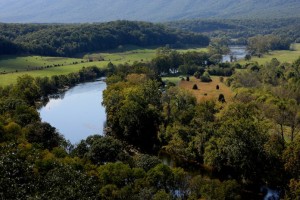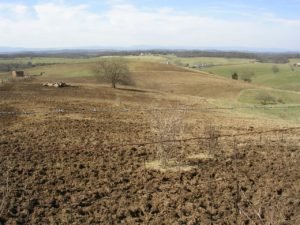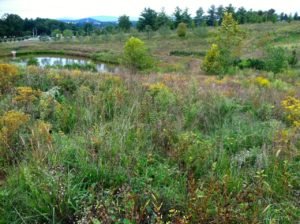“Well-managed” farmland and other working “open-spaces” should not be taxed when they provide ecosystem services exceeding the cost of public services for the land.

Well managed farmland helps produce clean water. This is the South Fork of the Shenandoah River. Photo by Beverly Pearce of The Downstream Project.
In many states including Virginia, local governments have a special way of collecting revenue from their constituents that have farmland or “open-space” called “land-use” taxation. It’s a method of calculating a tax on the land, based on how it’s used and the productivity of the soil. It is very beneficial for farmers because it taxes them for their pasture, cropland, and forest at a very modest rate. Many think this is a tax break for farmers but I believe these land uses, if managed well, shouldn’t be taxed at all.
These landowners are still taxed, just like everyone else for their residences, barns, outbuildings, tenant houses etc. The “open-space” I am referring to is only the land that is used for pasture, cropland, forest or other working landscapes that provide ecosystem services.
Now, just for the record, there are “open-spaces” receiving “land-use” taxes that, in my opinion, shouldn’t be – those lands that have been retired from food and fiber production and have morphed into large manicured lawns with big houses. Large lot residences are most often the costliest of all land uses because they fail to pay the true cost of the public services they demand. There are countless “cost of community services” studies that prove this.
For working landscapes with pasture, cropland, forests and wildlife habitat, I would like to offer an alternative to “land-use” taxation: not taxing these working lands at all. In fact, the landowners should be receiving credit for all the ecosystem services that these lands provide to the rest of us.
Allow me to make my case.
First let me define “well-managed”. In this case I am talking about “open-spaces” that are performing several functions. First these landscapes are building healthy soil; it’s not eroding and washing into streams. Secondly, Nutrient management is rigidly applied so that nutrients are not running off into streams or seeping into the groundwater. Next, functioning riparian buffers exist along streams and there are wildlife habitats. In other words the farm or other land meets what USDA calls a “Total Resource Management Plan”.
There are a lot of “well-managed” farms out there. Granted there are some that don’t come close but hear me out.

This is poorly managed pasture and does not provide the ecosystem services listed in the article. The soil erosion and polluted runoff from this field causes water pollution.
“Well-managed” farms provide far more ecosystem services to the public than they receive in public services. Soil is the regulator of the entire hydrologic cycle. It’s the carbon filter for our groundwater. Without this groundwater recharge area we would have no groundwater; it would mostly just runoff. How much is that worth? Our current economy does not factor in most ecosystem services.
Healthy soil can also store a lot of carbon: Many sources say at least twice what plants can sequester.
Farmland provides wildlife habitat and pollinator corridors.
Farms with riparian forest buffers supply clean water downstream. Streams with native trees along their banks are much more capable of detoxifying themselves than streams with no trees.

Native meadow at Martha Jefferson Hospital in Charlottesville, Virginia. This meadow functions as a buffer for the stream and a pollinator corridor. This working landscape should not be taxed.
Here in the Shenandoah Valley farmland provides amazing viewsheds that help drive the tourist industry.
What are all these ecosystem services worth? I purport that it is more than that land receives from the locality in the form of services.
Do the cows get on the school bus? Does the land require garbage pickup or police protection? Does the land require public roads?
Does the land require public water and sewer? On the contrary, that land is providing us with water. The fence along the stream and that watering trough for the cows is a far cheaper sewage treatment plant than the one that would have to be built if the farmer sold all that land for a housing development.
Think of the development costs to taxpayers if the farmland was developed. The taxpayers would have to pay for a new school, an upgrade for the sewage treatment plant, pipeline for water and sewer, landfill space and on and on.
Here’s a proposal and let’s allow landowners to decide which path to take:
If they have “well-managed” farmland let society pay them for the ecosystem services they are providing. If they don’t have a well-managed farm let’s help them get there. And for those few farmers that don’t want to have a “well-managed” farm let them pay the price of their “land-use”.
Hugh Hammond Bennett, the father of soil conservation in America said, “Society as a whole benefits from good land use; therefore, society as a whole should help pay for it”.
Well managed land provides ecosystem services including clean water, carbon sequestration, wildlife habitat and streams capable of detoxifying themselves. If the land is performing these vital environmental tasks why should the landowner be taxed for them?
When all our land is “well managed” we will no longer have “dead zones” in the Chesapeake Bay or the Gulf of Mexico. Our streams will be healthier, the Chesapeake Bay will be restored and we will have a more thriving economy.
The post Well Managed “Open-Space” Should Not Be Taxed (JMU 2019) appeared first on Getting More on the Ground.
